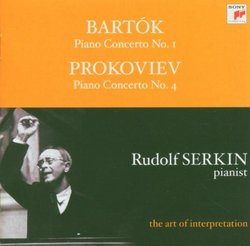| All Artists: Bela Bartok, Sergey Prokofiev, Eugene Ormandy, George Szell, Columbia Symphony Orchestra, Philadelphia Orchestra, Rudolf Serkin Title: Bartók: Piano Concerto No. 1; Prokoviev: Piano Concerto No. 4 Members Wishing: 0 Total Copies: 0 Label: Sony Original Release Date: 1/1/2005 Re-Release Date: 7/11/2005 Album Type: Import Genre: Classical Styles: Forms & Genres, Concertos, Historical Periods, Modern, 20th, & 21st Century, Instruments, Keyboard Number of Discs: 1 SwapaCD Credits: 1 |
Search - Bela Bartok, Sergey Prokofiev, Eugene Ormandy :: Bartók: Piano Concerto No. 1; Prokoviev: Piano Concerto No. 4
 | Bela Bartok, Sergey Prokofiev, Eugene Ormandy Bartók: Piano Concerto No. 1; Prokoviev: Piano Concerto No. 4 Genre: Classical
|
Larger Image |
CD Details |
CD ReviewsHE DIDN'T JUST DO BEETHOVEN DAVID BRYSON | Glossop Derbyshire England | 09/17/2005 (5 out of 5 stars) "In his early days as junior partner to Adolf Busch, Serkin had wanted to perform Bartok, but Busch scotched the idea. Of the three Bartok concertos for piano Serkin played only the first - the most uncompromising, the kind of Bartok that we find in some of the string quartets or in The Miraculous Mandarin ballet. I'm not aware of anything else that Serkin did by Prokoviev [thus spelt in this production] other than this concerto for left hand only, and although he gave the work its American premiere and committed it to record in 1958, he seems to have dropped it from his repertory thereafter.
I see no point at all in pious expressions of regret that Serkin focused his public attention in his later years more or less exclusively on a handful of composers, one of these being Reger. He was who he was, he was unique, and it was his call. On the one hand it's difficult to pick one's way through his n recordings of the concertos of Mozart Beethoven and Brahms to find the best ones: on the other there is a whole discography of unexpected items that can be read in the outstanding biography by Stephen Lehmann and Marion Faber published in Serkin's centenary year of 2003, and I suppose there's a chance that the current Sony series of reissues may spring some pleasant surprises on us - there has been one already, namely the Chopin preludes. This disc of Bartok and Prokoviev is not really a surprise. I have owned these performances on a very fine LP for many years, the sound-quality was very good on that and it has apparently been remastered on this cd, not that I think I could have told, and not that the cd itself says so. So far as performances of this Bartok go, this is the best I can recall, and I unhesitatingly rate it as preferable to the other two that I own, these being from Pollini and from none other than Peter Serkin. It may be that Peter Serkin's relationship with his father was a bit of an upper and a downer: what is certainly true is that he seems to have gone out of his way to adopt a different kind of touch - the difference is startling in their very first joint record, the Mozart concerto for two pianos performed when the younger Serkin was 14. In Bartok my own taste is for his father's kind of sound, which is not unlike that adopted by Pollini. It may have something to do with the recording, but it's Serkin's effect in this comparison too, more forceful in rhythm and fuller in tone, that strikes me as doing greater justice to this gaunt masterpiece, particularly in a sympathetic partnership with Szell and the Columbia (sc Cleveland) SO. In the Prokoviev I have no other version, and I'm in no headlong rush to acquire one. It is an interesting piece, after the Bartok it sounds almost romantic, I'm a Prokoviev enthusiast, but it's not his best and nowhere near the class of Ravel's great work for the left hand alone. This performance could hardly be more authentic, the orchestral role is provided by Serkin's other long-time buddies Ormandy and the Philadelphia, this has long been my idea of how the work should be done and I shall be very surprised if I ever hear another to overturn this opinion. Recommended to Serkin-collectors (now is your chance!), recommended to devotees of either or both of these composers, recommended to a new generation who never heard this great player, recommended to music lovers in general. You may or may not get some enlightenment from the liner note, which is in French with an English translation easily understood with the help of the original." |

 Track Listings (7) - Disc #1
Track Listings (7) - Disc #1